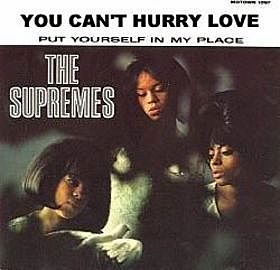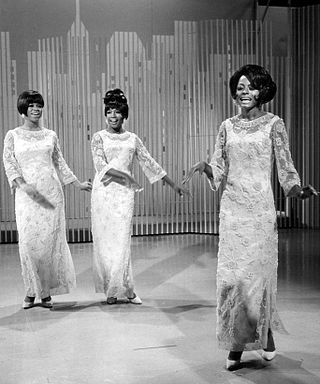"Someday We'll Be Together" is a song written by Johnny Bristol, Jackey Beavers, and Harvey Fuqua. It was the last of twelve American number-one pop singles for Diana Ross & the Supremes on the Motown label. Although it was released as the final Supremes song featuring Diana Ross, who left the group for a solo career in January 1970, it was recorded as Ross' first solo single and Supremes members Mary Wilson and Cindy Birdsong do not sing on the recording. Both appear on the B-side, "He's My Sunny Boy".

"Stop! In the Name of Love" is a 1965 song recorded by the Supremes for the Motown label.

"Reflections" is a 1967 song recorded by American soul music group The Supremes for the Motown label. The single release was the first Supremes record credited to "Diana Ross and the Supremes", and the song was one of the last Motown hits to be written and produced by Holland–Dozier–Holland before they left the label.

"Baby Love" is a song by American music group the Supremes from their second studio album, Where Did Our Love Go. It was written and produced by Motown's main production team Holland–Dozier–Holland and was released on September 17, 1964.

"Come See About Me" is a 1964 song recorded by the Supremes for the Motown label. The track opens with a fade-in, marking one of the first times the technique had been used on a studio recording.

"I Hear a Symphony" is a 1965 song recorded by the Supremes for the Motown label.

"You Can't Hurry Love" is a 1966 song originally recorded by the Supremes on the Motown label. It was released on July 25 of 1966 as the second single from their studio album The Supremes A' Go-Go (1966).

"You Keep Me Hangin' On" is a song written and composed by Holland–Dozier–Holland. It was first recorded in 1966 by American Motown group the Supremes, reaching number one on the Billboard Hot 100. American rock band Vanilla Fudge released a cover version in June the following year, which reached number six on the Billboard Hot 100. Wilson Pickett recorded it in 1969. English singer Kim Wilde covered "You Keep Me Hangin' On" in 1986, reaching number one on the Billboard Hot 100 in June 1987. In the first 32 years of the Billboard Hot 100 rock era, "You Keep Me Hangin' On" became one of the six songs to reach number one by two different musical acts. In 1996, American country singer Reba McEntire's version reached number two on the US Billboard Hot Dance Club Play chart. The BBC ranked the Supremes' original song at number 78 on The Top 100 Digital Motown Chart, which ranks Motown releases by their all-time UK downloads and streams.

American girl group The Supremes have released 29 studio albums, four live albums, two soundtrack albums, 32 compilation albums, four box sets, 66 singles and three promotional singles. The Supremes are the most successful American group of all time, and the 26th greatest artist of all time on the US Billboard charts; with 12 number-one songs on the Billboard Hot 100 and three number-one albums on the Billboard 200. The Supremes were the first artist to accumulate five consecutive number-one singles on the US Hot 100 and the first female group to top the Billboard 200 albums chart with The Supremes A' Go-Go (1966). In 2017, Billboard ranked The Supremes as the number-one girl group of all time, publishing, 'although there have been many girl group smashes in the decades since the Supremes ruled the Billboard charts, no collective has yet to challenge their, for lack of a better word, supremacy.' In 2019, the UK Official Charts Company placed 7 Supremes songs—"You Can't Hurry Love" (16), "Baby Love" (23), "Stop! In the Name of Love" (56), "Where Did Our Love Go?" (59), "You Keep Me Hangin' On" (78), "Come See About Me" (94) and "Stoned Love" (99)—on The Official Top 100 Motown songs of the Millennium chart, which ranks Motown releases by their all-time UK downloads and streams.

"Up the Ladder to the Roof" is a 1970 hit single recorded by The Supremes for the Motown label. It was the first Supremes single to feature new lead singer Jean Terrell in place of Diana Ross, who officially left the group for a solo career two weeks before the recording of this song in January 1970. This song also marks a number of other firsts: it is the first Supremes single since "The Happening" in 1967 to be released under the name "The Supremes" instead of "Diana Ross & The Supremes", the first Supremes single solely produced by Norman Whitfield associate Frank Wilson, and the first Supremes single to make the United Kingdom Top 10 since "Reflections" in 1967.

"I'm Livin' in Shame" is a 1969 song released for Diana Ross & the Supremes on the Motown label. The sequel to the Supremes' number-one hit, "Love Child," the song peaked in the top ten on the US Billboard Hot 100 pop chart at #10 and the top 20 in the UK at #14 in April and May 1969.

"Love Is Here and Now You're Gone" is a 1967 song recorded by the Supremes for the Motown label.

"My World Is Empty Without You" is a 1965 song recorded and released as a single by the Supremes for the Motown label.

"Love Is Like an Itching in My Heart" is a 1966 song recorded by the Supremes for the Motown label.

"Forever Came Today" is a 1968 song written and produced by the Motown collective of Holland–Dozier–Holland, and was first made into a hit as a single for Diana Ross & the Supremes in early 1968. A disco version of the song was released as a single seven years later by Motown group the Jackson 5.
"Let Me Go the Right Way" is a 1962 song written and produced by then Motown president Berry Gordy and released as a single by Motown singing group The Supremes. It was the group's fourth single and their second charted record following the dismal reception of their first charted single, "Your Heart Belongs to Me".
"Run, Run, Run" is a 1964 song written by Holland–Dozier–Holland and released as a single by Motown singing group The Supremes. After a couple of years of unsuccessful singles, the Supremes had finally broken through with a Top 40 single (23) in December 1963 with "When the Lovelight Starts Shining Through His Eyes". On the heels of its release, Motown rush-released a second HDH single titled "Run, Run, Run". Inspired by the sounds of Phil Spector and his Wall of Sound, it was an attempt to give the Supremes a poppier sound compared to their earlier heavy R&B recordings. Billboard described the song as a "strong follow up" to "When the Lovelight Starts Shining Through His Eyes," stating that it "has tough beat in a middle up groove that's great for dancing." Cash Box described it as "a pulsating, big sounding rocker with some torrid triplet keyboard work backing up."

"Nothing but Heartaches" is a 1965 song recorded by The Supremes for the Motown label.

"In and Out of Love" is a 1967 song recorded by The Supremes for the Motown label. It was the second single issued with the group's new billing of Diana Ross & the Supremes, the penultimate Supremes single written and produced by Motown production team Holland–Dozier–Holland, and the last single to feature the vocals of original member Florence Ballard.

"I'm Gonna Let My Heart Do the Walking" is a disco-styled soul single composed by the Holland brothers Eddie and Brian, members of the former Holland–Dozier–Holland team and was released as a single by Motown vocal group The Supremes in 1976 on the Motown label. It was the first single since "Your Heart Belongs to Me" in 1962 to feature four Supremes. It is also notable for being the last top forty single the group would score before they disbanded in 1977.

















